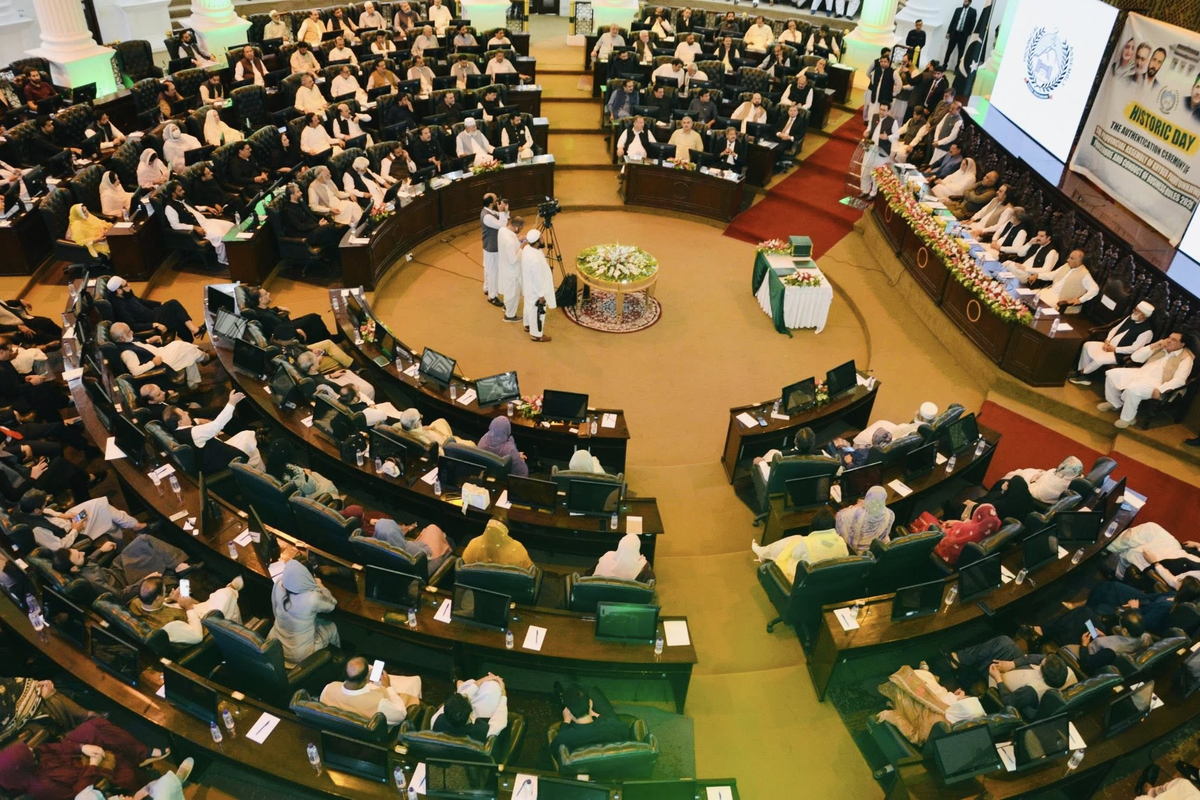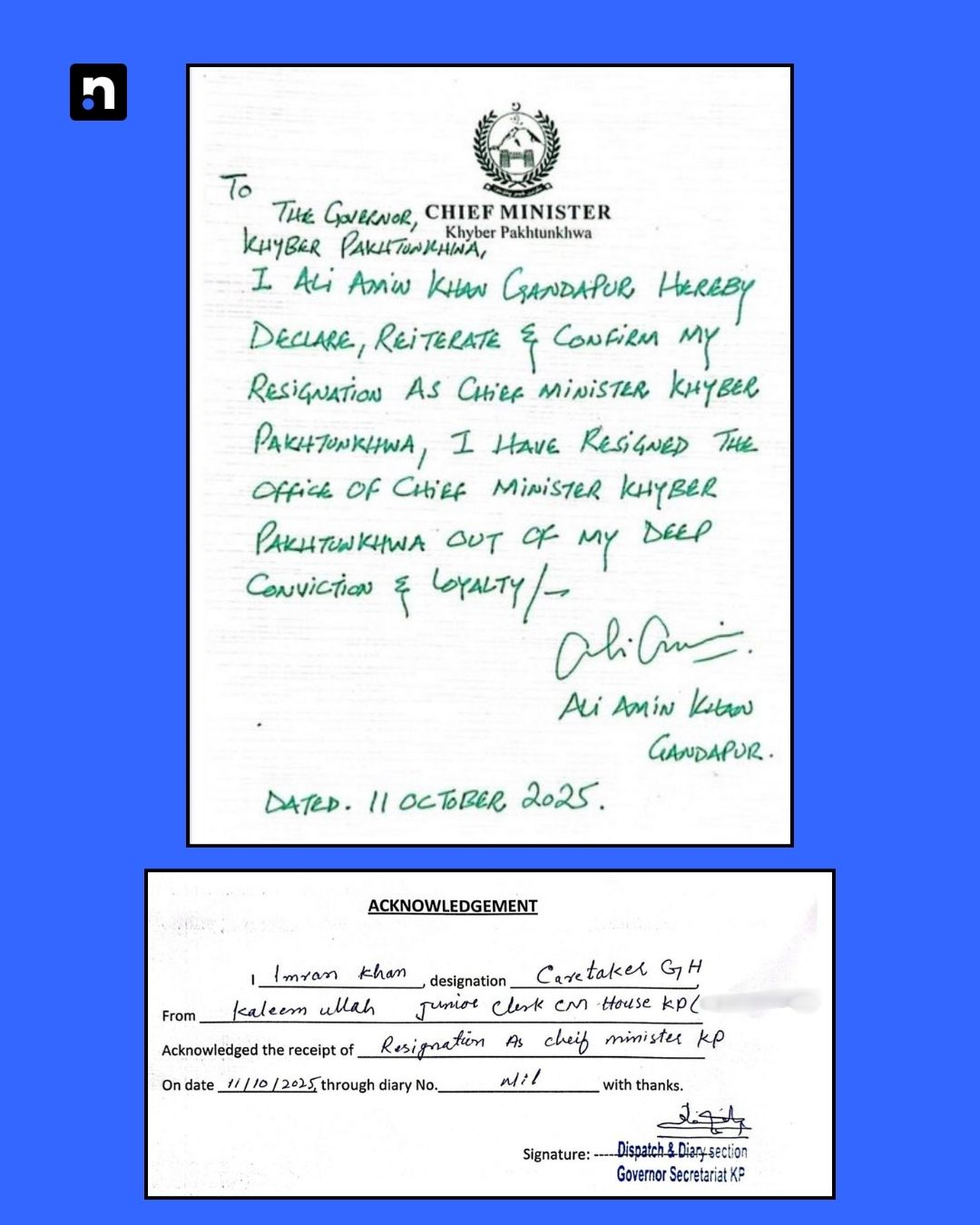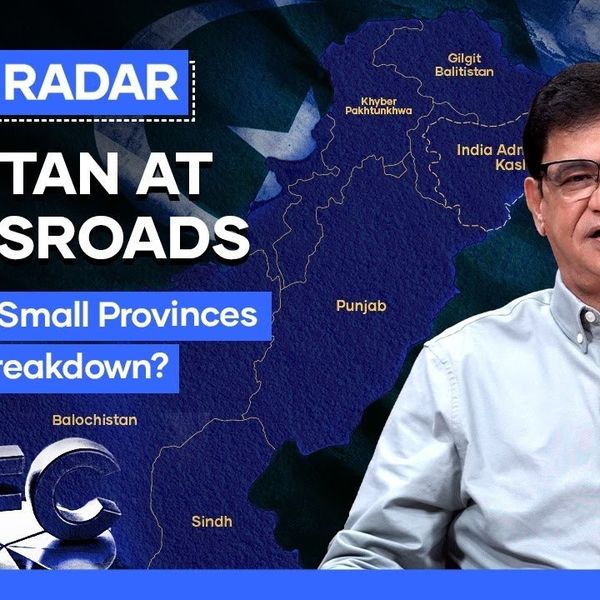Pakistan’s KP province to pick new chief minister on Oct 13 after Gandapur quits
PTI’s Salman Akram Raja said Sohail Afridi would be KP’s youngest and first CM from the tribal areas

Kamran Ali
Correspondent Nukta
Kamran Ali, a seasoned journalist from Khyber Pakhtunkhwa, Pakistan, has a decade of experience covering terrorism, human rights, politics, economy, climate change, culture, and sports. With an MS in Media Studies, he has worked across print, radio, TV, and digital media, producing investigative reports and co-hosting shows that highlight critical issues.

Governor Kundi confirmed that Gandapur's resignation has now officially reached his office.
KP Assembly
Pakistan’s Khyber Pakhtunkhwa (KP) Assembly will meet on October 13 to elect a new chief minister following the resignation of Ali Amin Gandapur, paving the way for a political transition in the northwestern province.
The move comes after jailed former prime minister and Pakistan Tehreek-e-Insaf (PTI) founder Imran Khan nominated Sohail Afridi as the party’s choice to lead the province. Afridi, if elected, would become the youngest chief minister in KP’s history and the first from the tribal belt.
PTI Secretary General Salman Akram Raja confirmed that the assembly speaker has formally summoned the session. “Afridi will be the youngest and the first chief minister from the tribal areas,” Raja said, emphasizing that the nomination reflects the party’s commitment to empowering the peripheries.
Gandapur’s resignation confirmed
In a related development, Gandapur resubmitted his handwritten resignation to Governor Faisal Karim Kundi after the governor stated earlier that the initial letter, sent on October 8, had not been received.

Governor Kundi confirmed on Saturday that the resignation had now officially reached his office.
“In accordance with the Constitution of Pakistan and relevant laws, the resignation will be processed after verification,” he said.
How the election process works
According to the KP Assembly’s Procedure and Conduct of Business Rules, 2025, the assembly must elect a new chief minister “without debate” whenever the position falls vacant.
Under Rule 18, nomination papers must be submitted to the assembly secretary by 3pm on the day of the election, while the speaker scrutinizes them an hour later. Candidates may withdraw their nominations before voting begins.
As outlined in Rule 21, the speaker then announces the final list of nominees before conducting the vote — with the candidate securing a majority declared the new chief minister.
Political journalist Lehaz Ali told Nukta that the voting process involves physically dividing lawmakers into separate lobbies to record their votes. “Members sign a register — for example, entering the ‘Ayes’ lobby for one candidate and the ‘Noes’ for another,” he explained. “Once the count is complete, the speaker announces the result.”
PTI holds numerical edge
According to the Election Commission of Pakistan (ECP), 92 of the KP Assembly’s members were elected as independents. Among political parties, Jamiat Ulema-e-Islam-Fazl (JUI-F) holds 18 seats, followed by Pakistan Muslim League-Nawaz (PML-N) with 17, Pakistan Peoples Party (PPP) with 10, Awami National Party (ANP) with four, Pakistan Tehreek-e-Insaf Parliamentarians (PTI-P) with three, and the Sunni Ittehad Council (SIC) with one.
Afridi reportedly enjoys the backing of 91 PTI-backed independents and one SIC member, giving the PTI-SIC alliance a total of 92 seats — a simple majority in the 145-member house. The joint opposition holds 53 seats, although the ANP has opted to stay neutral, reducing the active opposition strength to 49.
Experts warn of fragile majority
Analysts say that while the PTI-backed bloc commands a majority, its stability remains uncertain due to the independent status of its members.
Political analyst Arif Yousafzai told Nukta that “the PTI seems to have the numbers for now, but because its members are technically independents, that majority isn’t legally bound by party discipline - and that could create instability.”
Legal expert and former advocate general Shumail Butt agreed, explaining that independents cannot be disqualified for voting against any bloc’s decision.
“They do not belong to a party and have no parliamentary leader to issue binding instructions,” he said. “That freedom cuts both ways - it gives them autonomy but also makes alliances fragile.”
As KP heads toward Saturday’s vote, all eyes will be on whether the PTI-backed alliance can maintain cohesion long enough to ensure the election of its nominee, Sohail Afridi.










Comments
See what people are discussing